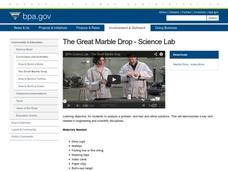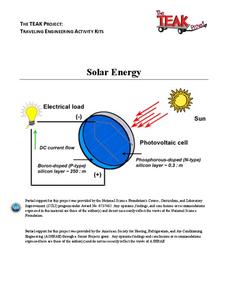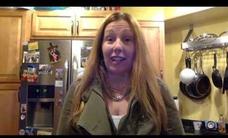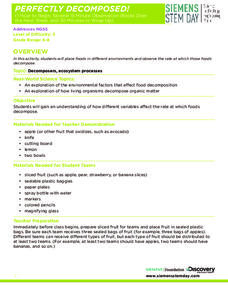Bonneville
The Great Marble Drop
Mike and Kellie, a team of electrical engineers, demonstrate how to to design a contraption that accurately drops a marble onto a target. The materials needed and general instructions are provided on the website or via a downloadable...
Rochester Institute of Technology
Solar Energy
Warm up to the idea of solar energy. A instructional activity includes three activities that challenge scholars to apply knowledge in new ways. First, they learn to run an alarm clock without a battery by using solar energy. Next, they...
Herff Jones Education
Chemical Energy
Provide the class with a quick lesson on chemical energy as they are assisted in creating hot and cold packs to demonstrate energy transfer between objects. They observe the energy change in matter as it transforms and distinguish...
American Physiological Society
Why is Kettle Corn Cooked in Copper Pots?
The kitchen — it's not just for eating anymore! Specific heat is often a difficult concept to grasp, so give it context by relating it to cooking. Learners gain experience in the principles of thermal energy transfer by designing an...
NOAA
The Climate Team: Make a Solar Heat Engine
Learners investigate how solar energy is converted into heat in part two of the 10-part Discover Your Changing World series. They build and test homemade solar cookers to boil water and cook rice. Pupils consider the impact of heat...
Howard Hughes Medical Institute
Modeling Food Webs in Darién, Panama
It's a jungle out there! Young biologists journey to Darien, Panama to examine the intricate relationships between the organisms that inhabit the jungle. Groups begin by demonstrating an understanding of energy flow in ecosystems, then...
Discovery Education
Cool It!
Adjust the melting time of ice without varying the temperature! Learners experiment with different materials to decide how the materials affect the rate an ice cube melts. They then connect their findings to the conductivity of each...
Discovery Education
It's Melting!
It's a race to the finish! Which ice cube will melt the fastest? Scholars discover the effect thermal energy has on melting ice. They experiment with melting ice cubes on different materials and learn that even at a consistent...
It's About Time
Building an Electric Motor
Rev your motor with a hands-on activity about electricity. Learners build their own electric motor before reading a handout and answering some questions.
NASA
Feel the Heat
Heat water up like a NASA engineer. Using the engineering design process, investigators create a system to trap and move heat through a water-filled tube. Designers participate in a post-activity discussion that highlights the role of...
DiscoverE
At Home: Keep a Cube Activity
Let cooler heads prevail. Future engineers first learn about heat transfer and insulation. They then design and build a contraption that will prevent an ice cube from melting for as long as possible.
American Physiological Society
Thermal Insulators: Keep it Hot!
There's nothing like a cup of hot chocolate on a chilly winter's day. Except for when that hot chocolate quickly becomes lukewarm chocolate ... or even cold chocolate. What material provides the best insulation to keep the chocolate from...
University of Waikato
Melting Glacial Ice
There are many factors that affect how fast the glaciers are melting. A lab investigation has learners examine how the surrounding water affect the rate glaciers melt. They collect data from two samples of ice to determine how quickly...
PBS
Insulation Station
It's all about the material. Learners experiment with different substances as they try to keep an ice cube from melting. They draw conclusions by answering a set of questions about the types and amount of material that had the best result.
Curated OER
More on Conduction and Convection
Why do some items feel colder when they are the same temperature? How should you keep your soda cold? What makes the wind blow? These are just some of the things middle schoolers discover when completing a lesson on conduction and...
Discovery Education
Perfectly Decomposed!
We all know someone who won't eat the banana with a brown spot, the grape with a dimple, and the apple with a bruise. Scholars use different fruits to explore what happens when fruits really start to decompose. They set up an experiment...
Discovery Education
Motion in the Ocean
How do temperature changes affect ocean currents? Scholars explore convection currents by demonstrating the flow of water in a baking dish. They use ice, heat, and food coloring to see currents. Then, they draw conclusions about their...
Science Friday
Make a Model Eardrum to Detect Sound Waves
Make sound waves visible with an experiment that asks middle schoolers to build a model ear drum using plastic bottles, rubber bands, plastic wrap, and sand-like substances.
Discovery Education
Smoke on the Water
How do clouds form? Learners demonstrate the formation of clouds and the water cycle by testing four different setups in a plastic bottle. They identify the key components of a cloud to help them understand the process of cloud...
Other popular searches
- Energy Transfer Diagrams
- Energy Transfer Ecosystem
- Heat Energy Transfer
- Transfer of Heat Energy
- Thermal Energy Transfer
- Types of Energy Transfer
- Transfer of Energy
- Transfer of Thermal Energy
- Energy Transfer Experiment
- Food Web Energy Transfer
- Energy Transfer Assessment
- Energy Transfer Wasted




















